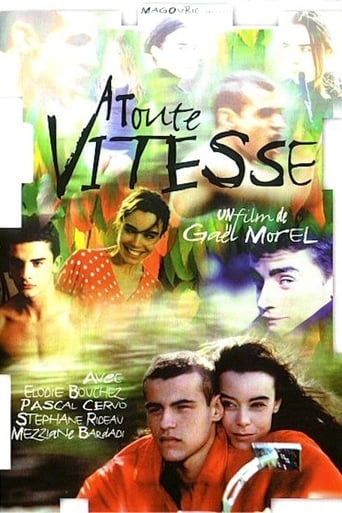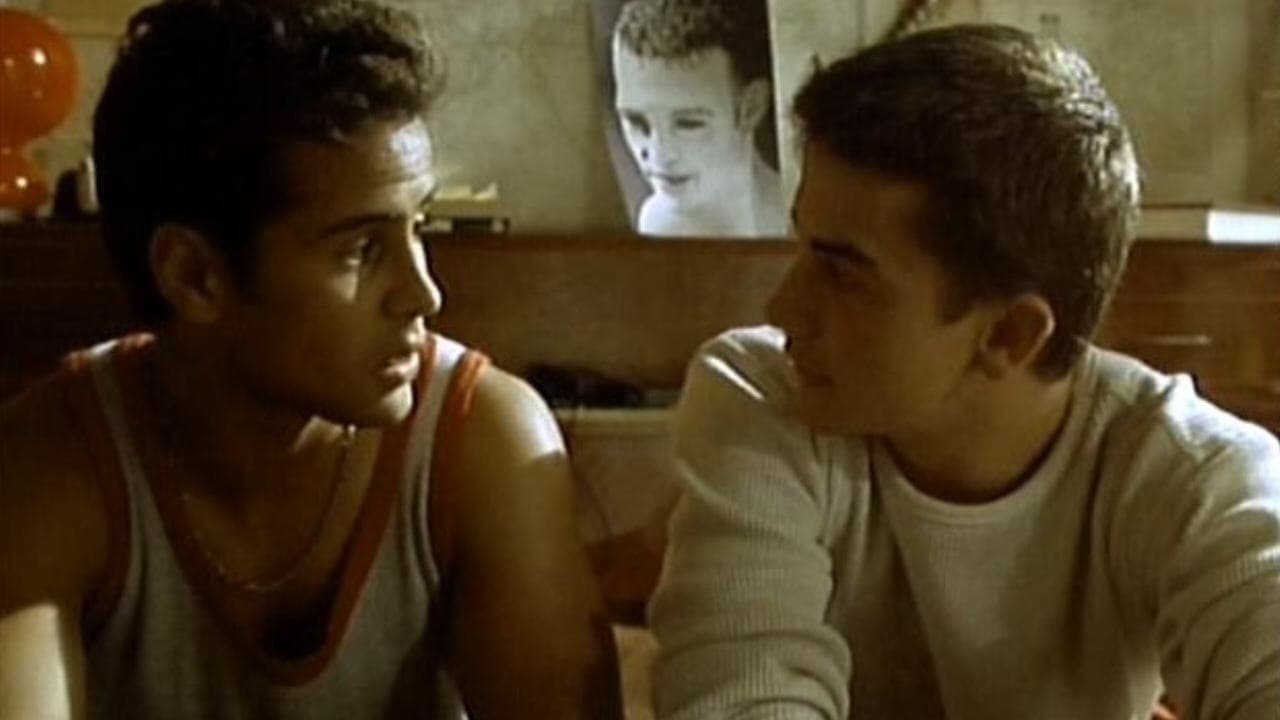Arcadio Bolanos
Can homosexuality be successfully articulated in society? According to some, homosexuals are doomed to be secluded and restricted to marginalized worlds. As filmmaker, Gaël Morel has often chosen to portray such worlds, enquiring deeply below the surface of what actually means to be an outcast.In "Le Clan", for example, Morel digs into the lives of outcast youngsters, which share an obvious resemblance to some of the protagonists of "À toute vitesse". There is, however, a much subtler approach of such topics in this film, perhaps as part of André Téchiné's influence (who appears listed in the credits).Spivak's book "Can the Subaltern Speak?" explains that authority is built upon a specific loci of enunciation. In this film, traditional society has already attributed a certain loci or place to those who dare to defy the heterosexual normative.Nonetheless, Morel goes much deeper than that. Handsome and talented Quentin is a young writer that has just won an award and is on his way to success. He does have quite an ambivalent position about marginalization. For example, he accuses the French bourgeois of misunderstanding his novel, as he has no intentions of depicting outcasts because for him they are normal people; he affirms that it is the bourgeois who constantly ostracize and discriminate others. Clearly, some of that is truth, as the mesocratic class tends to judge harshly those who do not fit into the symbolic order.As the film goes on, Quentin starts spending time with Samir, an Algerian boy that is still grieving the loss of his boyfriend; Quentin's tantalizing physic presence serves as cannon fodder for Samir's masturbatory urges as can be explicitly seen in one scene. Will the two boys consummate their passion or is only one of them interested in such consummation? Quentin apparently defends the rights of the Algerians as he publicly accuses acts of racism and violence, but at the same time he despises Samir just as much as he spurns Julie, his girlfriend or Jimmy, his best friend (interpreted by Stéphane Rideau, an actor extremely familiarized with gay productions). Over and over again, Quentin is seen as someone who takes advantage of social unfairness in order to gain publicity for himself, and certainly once he starts making his way in the publishing world he decides to move to Paris, quickly discarding friends and love interests.Jimmy is a jobless guy, with no real prospects of a 'decent' future. And Samir is a boy who barely has enough money to pay the rent. Except for Julie, all other characters are on the edge of poverty or delinquency. They are, however, strong and coherent. Julie trusts in the possibility to have a good relationship whether with Quentin or someone else, Samir decides to defend himself against French fascists that brutally assault him while Jimmy bravely defends Samir even if that means risking his physical integrity. Quentin, on the contrary, is unable to find coherence, his loci of enunciation becomes so firmly inserted in the symbolic order that he loses all true authority. That's how we can understand the lack of commitment in his acts: he has a relationship with Julie but seems willing to let her go as he sees fit; he starts a sentimental relationship with Samir only until he completes enough research for his next book; he supports gays or Algerians only as a marketing strategy, but he is never there when his friends need him. Despise all that, Morel manages to create a fascinating, talented, smart young man that carries the traits of a hero although none of the true virtues.
thesar-2
'Full Speed' is like 'Speed 2'; neither contained any sort of momentum. Perhaps I missed the boat on this one; sure, it was foreign, but it was very hard to follow. I guess there was this writer and some friends, some loved some, some were just loyal. It's labeled as a 'gay themed' movie and there was at least one gay person here, but it seemed like just a side character. For the most part, I was bored, waiting for that signature big-bad event that happens in almost all independent movies. When this one comes, no spoiler, it's so left-field it was hard to believe. Nothing really new here, nothing exciting. I seriously don't know how it got the title as slow as this was, but then again, like I said, I probably missed the boat. I've seen literally one hundred gay themed movies, including a multiple of foreign films. This does not rank anywhere in the top 90 of those. No one really to root for, no real character development. In fact, the acting in a lot of scenes was laughable. The funniest scene seems to be the most tragic: one character dies and all but does a 'Brady Bunch' death scene – so bad when his/her head hits the window that I was waiting for either the fake, studio audience laugh-track or "Oooohhh" to come. Since there was no real character to root for, no one that stood out as too evil or too good, it was all so ho-hum with very little direction. I see others giving this high ratings, and more power to them that they enjoyed it. Hopefully they'll realize there's dozens upon dozens better than this and move on to explore real visions of love and plight of gay characters.
december121531
Intersecting the lives of Arab youth in France, this film gives a brilliant portrayal of life and interpretations of young people in the region. The cast are beautiful and characters delicate. The lines are sturdy and the portrayals believable. I had hoped for more in the end, longing for a closure which never comes in life, and the intention by the director to give this sense is complete. I want more of their lives, as I have become attached to them in their sincerity and genuine qualities. I am left angrily in the middle, as an audience, wanting to mend the broken fences between what separates the distinct individuals of a society. I want the closure that will only come with peaceful and tolerable life. The closure that won't come, and yet which this film inspires an audience to covet. That which binds us to our humane selves.
gradyharp
Gaël Morel co-wrote (with Catherine Corsini) and directed this very French exploration of the manifestations of love in a style that feels more like eavesdropping on private encounters than on a linear drama. The plot is actually tightly woven around each of the four characters, at the same time giving the effect of four characters' viewpoints on love.Samir (Mezziane Bardadi) is a French Arab from Algeria who opens the film in a tender frolic with his 'blood brother' and quickly witnesses the accidental death of the man he loves. He travels to a small town in France, lonely, needy, feeling like an outsider (remember the history of the French Algerian conflict) and encounters a young novelist Quentin (Pascal Cervo) celebrating the publication of his first novel with his best friend Jimmy (Stéphane Rideau) and his girlfriend Julie (Élodie Bouchez) in a dance bar. Samir and Quentin make eye contact and soon a brief assignation outside the club leads to a kiss that the vulnerable Samir views as a sign of love but that Quentin views as strange but as possible content for his next novel.Quentin loves Julie, Julie loves Quentin, but has an eye on Quentin's best friend Jimmy, a lad faithful to his friendship with Quentin to the point of fending off Julie's enamourment. But when Quentin and Samir begin spending extended periods of time together (Samir longing for a physical relationship, Quentin refusing but intent on gathering information for his novel), affinities are tested. Quentin departs for Paris to write, Jimmy and Julie begin a lusty affair, and Samir feels again deserted by a lover. Samir is attacked by gay bashers and defended by Quentin who in the course of the fight sustains a head injury, an injury at first easily resolved but one that later leads to tragedy. Quentin returns from Paris to discover Julie has found love with Jimmy and while Samir's obsession with Quentin races at the new availability of Quentin as a partner, Quentin is disgusted and returns to his career as a writer in Paris and the story comes to a protracted ending with a series of sad incidents: Quentin, the core of each of the love stories remains aloof, dedicated to his growing fame as a writer and gleaning the events as fodder for his assent to literary fame.The stories are bound with threads if same- gender love, homophobia, human frailty and need. The actors are all beautiful for the eye and render tender performances. The countryside of France is exquisitely captured by cinematographer Jeanne Lapoirie and director Gaël Morel manages to weave these little stories in a conversational, simple manner that appeal to the heart and the eye. For some the film may seem rambling and disconnected and unfairly compared to 'The Wild Reeds', but Morel has a sensitive, gentle manner in setting a mood that allows it to flow like a stroll through the flowering woods of young passions. Recommended. Grady Harp


 AD
AD


